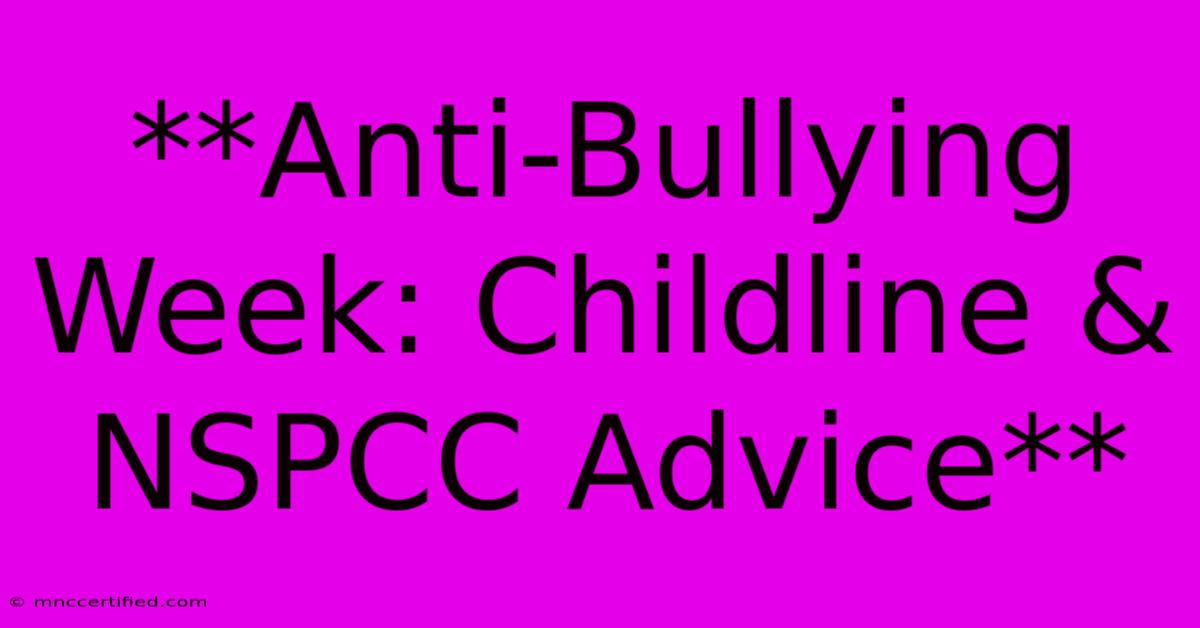**Anti-Bullying Week: Childline & NSPCC Advice**

Table of Contents
Anti-Bullying Week: Childline & NSPCC Advice for Kids and Parents
Anti-Bullying Week is a crucial time to raise awareness about bullying and provide support to those affected. The NSPCC and Childline, two leading charities dedicated to child protection, offer invaluable resources and advice for children and parents alike. This article explores their insights on how to prevent, address, and cope with bullying.
What is Bullying?
Bullying is repeated, unwanted behaviour intended to hurt or intimidate someone. It can take many forms, including:
- Physical bullying: Hitting, kicking, shoving, or damaging property.
- Verbal bullying: Name-calling, teasing, insults, and threats.
- Cyberbullying: Spreading rumours online, sending hurtful messages, or posting embarrassing photos.
- Emotional bullying: Isolating someone, spreading gossip, or controlling their behaviour.
Remember: Bullying can be harmful to a child's mental and emotional well-being. It's never okay and it's important to seek help if you or someone you know is being bullied.
Childline: Support for Children
Childline offers confidential support to children and young people experiencing bullying. They provide:
- A free 24/7 helpline: Call 0800 1111 to talk to a trained counsellor about bullying and any other concerns you may have.
- Online support: Visit their website to access information, resources, and a safe online chat service.
- Information about bullying: Learn about different types of bullying, how to identify it, and what to do if you're being bullied.
Childline emphasizes that children should never feel ashamed or embarrassed to reach out for help.
NSPCC: Advice for Parents
The NSPCC offers practical advice and support for parents dealing with bullying:
- Understanding the problem: Educate yourself about the different types of bullying and how it can impact your child.
- Communicate with your child: Encourage open conversations about bullying and create a safe space for them to share their experiences.
- Listen without judgment: Avoid dismissing their feelings or telling them to "just ignore it".
- Take action: Talk to the school, other parents, or seek professional help if necessary.
- Help your child develop coping mechanisms: Teach them self-confidence building strategies and ways to stand up for themselves.
The NSPCC also advises parents to:
- Monitor online activity: Be aware of your child's online behaviour and keep them informed about online safety.
- Teach them about digital footprints: Explain the importance of responsible online behaviour and how their actions can have lasting consequences.
- Be a positive role model: Model respectful communication and treat others with kindness and empathy.
Preventing Bullying: A Collective Effort
Combating bullying requires a collective effort from schools, parents, and communities. The NSPCC and Childline emphasize the importance of:
- Promoting positive relationships: Encourage kindness, empathy, and respect in all environments.
- Developing anti-bullying policies: Ensure schools have clear guidelines and procedures for addressing bullying.
- Raising awareness: Educate children and adults about the impact of bullying and how to prevent it.
Conclusion
Anti-Bullying Week serves as a reminder that bullying is a serious issue impacting countless children. The NSPCC and Childline provide vital resources and support for children and families. By working together, we can create a safer environment where all children feel respected and valued. Remember, you are not alone. Seek help if you need it, and be a part of the solution in preventing bullying.

Thank you for visiting our website wich cover about **Anti-Bullying Week: Childline & NSPCC Advice**. We hope the information provided has been useful to you. Feel free to contact us if you have any questions or need further assistance. See you next time and dont miss to bookmark.
Featured Posts
-
Scottish Premiership Rangers Vs Hearts Live
Nov 11, 2024
-
Sheffield Wednesday Fan Under Investigation For Taunting
Nov 11, 2024
-
Uk Ambassador Marks Armistice Day In Diego Suarez
Nov 11, 2024
-
Mohammad Rizwan Makes History In Australia
Nov 11, 2024
-
Public Liability Insurance Singapore
Nov 11, 2024